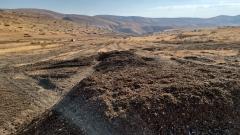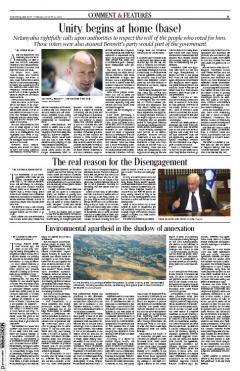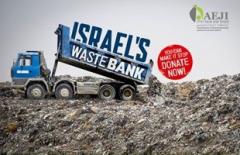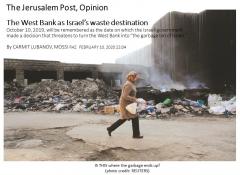Circular economy: An opportunity for Israelis, Palestinians - opinion
These presentations generated a positive exchange of opinions and experiences among the participants, which led the discussion to some crucial conclusions.
By EMANUELA ROSIA, CARMIT LUBANOV, FRANCESCO BRUNI
JULY 7, 2021 20:59
At the beginning of July 2021 the event for media and stakeholders on waste management in Israeli-Palestinian territories was held online, with the participation of important actors in civil society. During the webinar, sustainable projects and innovative actions realized in this complex region were discussed, underlying the positive results generated for the environment and for the local population.
Thanks to the collaboration between the Associazione Internazionale Comunicazione Ambientale (International Association for Environmental Communication, AICA, Italy), the Association of Environmental Justice in Israel (AEJI) and the Jerusalem Center for Women (JCW Israel), the webinar entitled Circular Economy: A challenge for Israel, West Bank and Gaza Strip? offered the chance to recognize positive experiences of international cooperation and sustainable development.
Emanuela Rosio, president of AICA, introduced the meeting while environmental consultant Roberto Cavallo, CEO of E.R.I.C.A. soc. coop. showed the concrete impact of a circular economy as an opportunity for development and job creation. Umberto Gianolio, also of E.R.I.C.A., provided an intervention strategy for the Gaza Strip in order to activate routes for recycling and reuse, starting from separate collection and specifically addressing organic waste, which represents 55% of total waste production.
Fadwah Khawaja, JCW general-director, offered an overview on waste management in the West Bank administered territories, focusing on the role of women in society. Indeed, the circular economy may represent possibilities to build new economic opportunities for the weakest population groups as well. Lastly, AEJI Executive Director Carmit Lubanov described the ongoing situation in the Palestinian Authority areas in the West Bank, the environment issues and why a circular economy is an important undertaking for the Palestinians to set forth positive cooperation and to develop new economic strategies.
These presentations generated a positive exchange of opinions and experiences among the participants, which led the discussion to some crucial conclusions: the current waste storage system in landfills is not sustainable anymore; transitions towards new circular models are urgent. Several positive effects would result from these changes, with lower levels of land and water pollution, fewer landfills, increased job opportunities and, most of all, the creation of functional relations among local authorities, which could foster dialogue and long-term collaboration.
The writers are Emanuela Rosio, president Associazione Internazionale Comunicazione Ambientale, (AICA Italy), Carmit Lubanov, executive director, Association for Environmental Justice in Israel, (AEJI), Francesco Bruni, Associazione Internazionale Comunicazione Ambientale, (AICA).





